HOMILY CHRISTMAS DAY – YEAR B
Christmas: Just a Celebration or a Life-changing Experience?
(Isaiah 52:7-10; Psalm 98; Hebrews 1:1-6; John 1:1-18)
**********************************************************
Two young brothers, staying overnight at their grandparent’s house, were praying their night prayers. One was praying silently while the other was shouting out loud what he wanted for Christmas. The first chided the other, telling him that God was not deaf. The latter replied that God wasn’t deaf, but Grandma was hard of hearing.
Are we experiencing Christmas or just celebrating it?

Nativity by Andrew Bennett
Merely celebrating something does not equal really experiencing it. How can we experience Christmas? Very simply, by putting our complete faith and trust in Jesus as our Savior and Lord.
The long dark nights at this time of the year are a reminder of the darkness that infects our world. Globally, there is war, violence, human trafficking and now a global pandemic that threatens everyone. In our communities there is all too often injustice, corruption, divisions, abuse and struggling relationships. In our selves the darkness takes the form of often deadly addictions, acts of sin, and sinfulness such as false pride, denial and blame, self-righteousness, anger and an insatiable need for control.
This darkness, however, is not the last word. The darkness of our world, and the darkness in us, has been overcome by this Jesus who came to live among us. The readings last night presented Jesus as Messiah, Savior and Lord. Today’s readings add more titles, presenting Jesus as Son of God, Word of God, True light, grace and truth and ultimately, the salvation of God. For the Apostle John, Jesus is the one who was, who is and who is to come. Most of all, in Jesus salvation has already come and we can experience that salvation through faith in Him.
Our response is to be humble, to admit our darkness and our need for him and to share our brokenness with one another. Our response is to believe, to pray, to let go of that darkness and to experience Christmas, not just celebrate it.
In John’s gospel today, we hear this: “In the beginning was the Word.” No first-century Jew would have missed the significance of that opening phrase, for the first word of the Hebrew Scriptures, bereshit, means precisely “beginning” signifying a new creation.
In a similar tone, Matthew’s gospel, the first words we see and hear in the New Testament, begins with the genealogy of Jesus, which is a mixture of saints and sinners, such as Jacob, who wrestled with God; Ruth who was a foreigner, an outsider; David, a great king yet also murderer and adulterer; Rahab a prostitute, and some who are unknown and unsung. Yet Jesus was pleased that all of these were his ancestors, part of his family tree.
The lesson to be gained from this is that God, in Jesus, came into our very flawed and dysfunctional human condition, and can be born in us, whether we are also wrestling with doubt, feeling like an outsider, ashamed of some secret sins, feeling totally unworthy because of our past, or just over-looked and un-appreciated. Through the incarnation, God accepts us as we are, but believes in whom we can become, and that is Good News indeed.
Admitting our darkness in the sacrament of reconciliation is one of the best ways to experience the power of the One who came to save us from our sins. Sharing in the Eucharist and living it out in love is a central way that we can experience that liberating love of God. Truly working the 12 Steps of Alcoholics Anonymous is another way that many could experience Christmas in their lives. Participating in the Returning To Spirit program of personal and communal healing and reconciliation that is currently spreading across western Canada is another way.
Velma is a grandmother who expressed her faith in Jesus by consciously setting out on a healing journey that involved dealing with her anger and resentment from past hurts. She grew in personal freedom and self-confidence. She presently works in a dysfunctional work situation where there is a lot of manipulation and control among the staff. Instead of harboring resentment in her heart, she practiced the skills she had learned on her healing journey and communicated her hurt feelings to the others with love, as Jesus taught us to do. She actually shocked her co-workers in doing so, for this was behavior that was not usual nor expected. She had changed, took positive action and was able to move on with her life with peace in her heart. To her surprise, her actions led to some positive changes in her work situation. She had experienced Christmas (God among us as savior and Lord) in her life, and not just celebrated it.
The Eucharist that we now celebrate is an act of faith. We believe that the same Jesus who took on human flesh two thousand years ago now becomes present among us through the humble gifts of bread and wine. We who believe, who put our faith in him, experience his salvation and are empowered to go out to share it with a world that still lives in darkness.
So, to experience Christmas in our lives, let us be humble and put our faith in Jesus as Savior and Lord.



